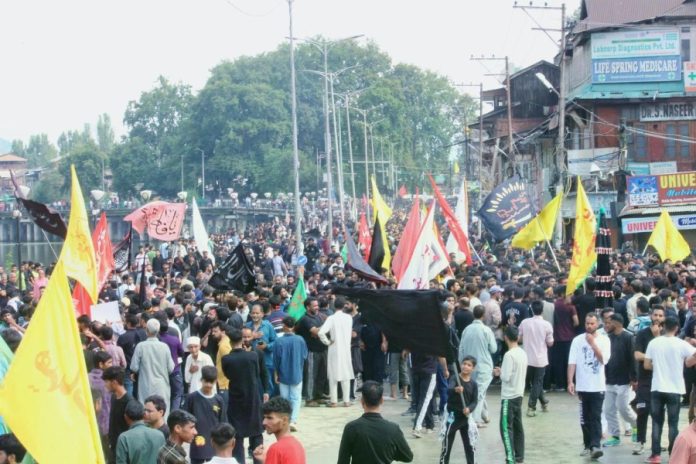It’s after a more than three decade hiatus that Srinagar once again witnessed the traditional Alam Sharief procession that marks the occasion of 8th Muharram and the fact that this major event in which about 25,000 people participated went off peacefully makes it even more remarkable. This is indeed an extremely positive development and the credit for which goes to the UT administration, security forces, law enforcement agencies, and most of all, the people of Kashmir.
There can be no two views that consequent to Article 370 abrogation, Pakistan has gone on an overdrive to buttress its false narrative that there’s no normalcy in Kashmir and is leaving no stone unturned in orchestrating violence in Kashmir through its proxies. Hence, the UT administration deserves due appreciation for its momentous decision of allowing the Alam Sharief procession to proceed along the entire stretch of the five kilometre long traditional route.
Needless to say, the UT administration’s decision to accord permission for this mammoth procession wouldn’t have been possible without sustained efforts of the security forces and law enforcing agencies that helped in creating a safe environment. At the same time, it would be wrong to assume that these agencies are alone responsible for the improved security conditions in Kashmir Valley, because things couldn’t be what they are without the wholehearted cooperation of locals who have outrightly rejected attempts by vested interests to incite violence.
While National Conference [NC] vice-president [VP] Omar Abdullah has welcomed this development, he has nevertheless called upon the administration to “take a few more right steps in the right direction to restore actual normalcy in J&K.” He has demanded that there should be no restrictions on Friday prayers at the Jama Masjid, Srinagar and offering Eid prayers at Eidgah and said that “restrictions on Mirwaiz Umar Farooq should also be lifted so that he can fulfil his religious obligations.”
The NC VP’s suggestions are undoubtedly relevant. Having served as chief minister [CM] of J&K he’s well aware of the multi-faceted reasons that necessitate imposition of restrictions, both on prayers at Jamia Masjid as well as Mirwaiz Farooq. So, isn’t his simplistic view insinuating that these restrictions are purely the whims and fancies of the administration rather surprising? Will the Abdullah scion care to explain as to why were restrictions imposed on offering prayers at Jamia Masjid and the reasons for placing Mirwaiz Farooq under house arrest when he was the CM of J&K?
The problem is that in order to serve their masters sitting across the Line of Control [LoC], the pro-Pakistan lobby in Kashmir has brazenly mixed religion with secessionist ideology and promotes mob violence including murderous assaults as a justified form of protests. To make matters worse, selective silence on such despicable acts by separatist leaders and religious preachers like the Mirwaiz gets interpreted as sanctified approval of violence.
I have no personal issues with Mirwaiz Farooq. And even though I univocally oppose his views on the Kashmir issue and his reluctance to condemn senseless violence by irate mobs, I still respect him. To my mind, he is perhaps the only separatist leader who has shown spine by publicly admitting way back in 2007 that “the dialogue process to resolve the Kashmir issue should be given a chance as efforts through military means have not achieved any results except creating more graveyards.”
However, Mirwaiz is also the same person who chose not to condemn or even condole the 2017 lynching of J&K Police officer Mohammed Ayub Pandit by an irate mob just outside Srinagar’s Jamia Masjid where he was presiding over Shab-e-Qadr prayers. Even though he was in no way involved, one had expected that following his religious calling, the Mirwaiz would most certainly condemn this cold blooded murder that took place on the auspicious ‘Night of Power’. Even if didn’t consider this appropriate, humanity demanded a word of condolence to the deceased officer’s family members.
Thanks to the unprincipled ploy of unscrupulous entities and people, Friday prayers in Srinagar’s Jamia Masjid have unfortunately become synonymous with spontaneous outbreak of violence. Those who complain that restriction on offering Friday prayers at Jamia Masjid infringes on their fundamental rights must not forget that the government is charged with the responsibility of maintaining law and order as well as ensuring safety of people and property [both public and private]. Hence, the administration is justified in imposing any restrictions as a precautionary measure to fulfil its constitutional responsibility.
While the decision to permit the Alam Sharief procession indicates the administration’s willingness to remove restrictions on religious events, the smooth conduct of this activity and the orderly manner it was conducted reflects reciprocation in the form of deep social responsibility displayed by the organisers and participants. While post Friday prayer protests achieve nothing, they tend to mislead the unversed into making the cardinal error of judgment by correlating Islam with violence, which is not at all desirable and urgently needs to be remedied.
And if influencers and religious heads can successfully convince the people to rightfully disassociate religion from politics, then why would the administration continue to impose restrictions on other religious events? Wouldn’t this be the ultimate ‘win-win’ situation for all?
As they say, it takes two to tango!

